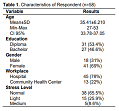The effect of e-counseling to reduce stress on nurses in special wards COVID-19

Downloads
Background: Data on the incidence of COVID-19 is reported to be increasing day by day. It impacts the health of health workers both physically and mentally; several previous studies have found that counseling can help reduce anxiety. Other studies have also proven that remembrance therapy can reduce stress levels, but the effectiveness of e-counseling has not yet been tested.
Objectives: This study was to determine the effect of e-counseling to reduce stress on nurses in special wards COVID-19.
Method: The research design used was a quasi-experimental design with a total sample of 58 people, 29 intervention samples, and 29 control samples. Sampling using non-probability sampling and data collection using a questionnaire which was analyzed with the Independent Sample T-Test.
Result: After e-counseling therapy was carried out, the stress level of nurses could decrease significantly from 7.448 to 6.311. There were significant differences in stress levels in the intervention and control groups (69.59±6.311 vs. 49.83±8.824; p<0.05).
Conclusion:Â E-Counseling has a very significant effect on reducing the stress level of nurses in special wards COVID-19.Authors retain copyright and grant the journal right of first publication with the work simultaneously licensed under a Creative Commons Attribution-NonCommercial 4.0 International License that allows others to share the work with an acknowledgement of the work's authorship and initial publication in this journal.
Authors are able to enter into separate, additional contractual arrangements for the non-exclusive distribution of the journal's published version of the work (e.g., post it to an institutional repository or publish it in a book), with an acknowledgement of its initial publication in this journal.
Authors are permitted and encouraged to post their work online (e.g., in institutional repositories or on their website) prior to and during the submission process, as it can lead to productive exchanges, as well as earlier and greater citation of published work (See The Effect of Open Access).

This work is licensed under a Creative Commons Attribution-NonCommercial 4.0 International License.











